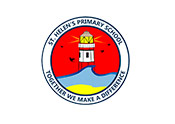Curriculum Vision
St. Helen’s Primary School curriculum vision has been created in collaboration with staff, pupils, parents and governors.
At St. Helen’s, a broad and ambitious curriculum for all is designed to: recognise children’s prior
learning, provide quality first-hand learning experiences, be relevant to the pupils in the here
and now and, as far as we can predict, be relevant to the modern world. Its aim is to allow
the children to develop interpersonal skills, build resilience, become creative, critical
thinkers and underpinned by our values of togetherness and collaboration.
Our school serves a Historic Headland community- steeped in heritage. We see involvement in our
community as an essential part of our Curriculum, as we celebrate local traditions, (e.g. Bombardment,
Wintertide festival). Wider local community involvement too is essential as we work with many primary
schools, secondary and organisations from across the town of Hartlepool and North East.
We encourage pupils to see themselves as an integral part of the wider global
community and see themselves as force for change.
We can only ensure that our pupils become educated citizens by exposing them to the best that has been
thought and said. We welcome all and encourage differences within our school community and strive to
address any form of barrier or disadvantage. Our curriculum strives to ensure that pupils have an
understanding of and strategies to help attain good mental health and wellbeing.
The ability to learn is underpinned by the teaching of basic skills, knowledge, concepts and
values. Children are supported to ensure they are able to read, write and use mathematical
knowledge, ideas and operations to ensure they can access a broad and balanced
curriculum throughout their life. We aim for the pupils to not only know what they are
learning but gain an understanding and appreciation of why they are learning it.
We provide enhancement opportunities to engage learning and believe that
childhoods should be joyful, investigative and enquiring time in children's lives, where there are
no limits to curiosity, where errors can be made and developing a thirst for new experiences
and knowledge.



Close